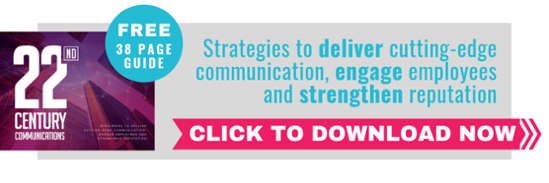Let’s Demonstrate We Value Our People, and Pay Them Appropriately

An open letter to the public relations industry I care deeply about:
We can and need to do better.
I recently met with a job candidate* from one of the fine large agencies in our industry. He had about five+ years of experience, brought an excellent skill set and a track record of proven experience and expertise in internal communications, which is why we approached him about possibly joining my firm.
In our discussions, he was open to exploring an opportunity where everyone around him was passionate about communications on the “inside,” and appreciated the benefit of continuing to learn from professionals who have been there, done that.
In my experience, the pool of candidates with a differentiating specialization in internal communications is very small. Our field is relatively new. While many candidates have created a tactic or even an event aimed at employees, that doesn’t qualify as having expertise in internal communications, much like writing an earnings release doesn’t make you an investor relations expert. As in all communication disciplines, the ability to make the transition from tactics to thoughtful counsel requires a dedication to a particular area, which won’t be developed by simply continuing to produce a newsletter or social media campaign.
I’m concerned there’s an unintentional system in place that prevents our best people from both knowing, and showing, their value.
The need for qualified consultants is only going to increase in the future as business becomes increasingly more global, complex and competitive. That means we need smart, experienced thoughtpartners to help senior leadership successfully lead and drive change authentically, and in ways that are respectful to the myriad of stakeholders, especially employees, on whom the organization’s success or failure depends.
So, what are we doing to ensure we’re developing our best talent? I’m concerned there’s an unintentional system in place that prevents our best people from both knowing, and showing, their value.
Underpaid and Underappreciated
Back to our highly-qualified candidate who has specialized skills in internal communications. As he shared with us his salary and overall benefit package, I was dumbfounded. His value in base salary alone, given his expertise and demonstrated capability was at least 35 - 45 percent more than he was currently paid. That’s not just a small gap in salary; to me that says that the work this person does is significantly undervalued, and therefore, he is undervalued. As much as I wish this were an isolated case, my experience tells me it’s all too common.
Which is why we were speaking to him in the first place—he was looking for more somewhere else—taking his skills and seeing what was out there.
Why is it that often people need to leave their organizations to get promoted or to be paid commensurate with their worth? I’ve seen this across organizations and industries; it’s not just an issue for public relations and communications. I’m bringing this up with you, because we can do something about it within our industry. Working in the field of employee engagement, I understand the multiple factors that employees value, and what motivates employees to do more. While salary is just one of the factors, it does demonstrate the value an organization places on the skills of their team—and it takes on a greater importance with this kind of disparity.
Working in the field of employee engagement, I understand the multiple factors that employees value, and what motivates employees to do more. While salary is just one of the factors, it does demonstrate the value an organization places on the skills of their team.
The impact of salary is also greater to our colleagues who are just moving beyond their initial hiring status to being more accomplished consultants. It is just at this point, when they’ve entered the mid-level of their career, that their experience and skills are paying real dividends. However, instead of recognizing their new value, we’re locked into who they were, not who they are—and as a result they start looking outside for their next opportunity.
That got me wondering about why this was, and how to be part of the solution.
First, every person remains responsible for their career
I’m a firm believer first and foremost that the individual is responsible for his or her own career. I am passionate about all the things professionals can do to advance their contribution and position through sound strategies and a clear understanding of their value. They own their own future.
What should agencies and other organizations do then?
However, the question I’m asking today is what – if any – responsibility do organizations have here? In terms of people growing in our industry, what’s the responsibility of agencies when it comes to how their growing professionals are treated and compensated?
 I would argue that their responsibility is significant and it’s also in their self-interest. Employees either take great care of their clients and grow the business, or they don’t. They go the extra mile for clients at defining moments, or not. Employees make a choice every day as to how engaged they are – and in our profession, that is the entire product our clients are buying.
I would argue that their responsibility is significant and it’s also in their self-interest. Employees either take great care of their clients and grow the business, or they don’t. They go the extra mile for clients at defining moments, or not. Employees make a choice every day as to how engaged they are – and in our profession, that is the entire product our clients are buying.
As the training ground for many in our profession, I think there’s an added responsibility – a social responsibility – to the future leaders in our field that falls on the shoulders of big agencies, and organizations with large communication departments.
How might the big agencies and large organizations build on their excellent intern programs, with all of their developmental components, to ensure that employees at every level have opportunities to learn and grow, especially those in the 5 - 7 year range? And benefit from a compensation structure that recognizes and rewards the best professionals? Especially because research shows it’s the most junior employees who are typically the most profitable in an agency environment. Maybe more of those profits could be funneled into further development opportunities for the best employees at every level of the organization.
Counter-Intuitive
You might be wondering what happened to the job candidate. He took our offer back to his agency. They countered, made some promises that things would change, and he decided to stay.
What I’ve learned over time is to judge an organization by what they do when they aren’t forced into a decision; an organization who values an employee pays him or her fairly because the employee’s performance merits it. Period.
I don’t know if what they promised will come to pass. My guess is that some commitments will, and some won’t, as is typical in these types of situations. However, what I’ve learned over time is to judge an organization by what they do when they aren’t forced into a decision; an organization who values an employee pays him or her fairly because the employee’s performance merits it. Period.
Not because the employee says he is leaving. Not because the agency starts to panic about losing that person, wondering who will take care of the work. Not because there’s a concern about who will ensure continuity with clients, and not because someone realizes the time, energy, and cost to replace a strong employee is significant. Too little; too late.
That said, this experience inspired a real concern about how we’re developing, and compensating, the next generation of leaders. I hope our profession can take seriously the importance of helping people develop so they can bring their best selves to work. And monitor employee compensation when it isn’t in sync with the employee’s performance. It might eat into the profits in the short-term, but surely will be a long-term gain to the bottom line and make a significant difference in the lives of those who will lead our profession in the future.
—David Grossman
*Our candidate is a composite of several recent candidates.
Click below to download—22nd Century Communications: Strategies to Deliver Cutting-Edge Communication, Engage Employees and Strengthen Reputation—and get key insights into the top 10 principles some of the best organizations employ to ensure their communication strategy is a positive lever in building a stronger business. 

Comments on this post